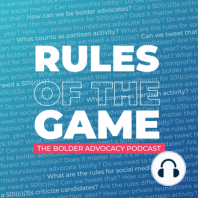11 min listen

Convening and Commenting on Debates
Convening and Commenting on Debates
ratings:
Length:
18 minutes
Released:
Oct 7, 2020
Format:
Podcast episode
Description
With national attention on the Presidential and Vice-Presidential debates, it’s a good time to cover the rules for how nonprofits can convene and comment on debates. Our attorneys for this episode Tim Mooney Jen Powis Quyen Tu Shownotes Public charity 501(c)(3)s can educate candidates and voters. Many debates are run by 501(c)(3)s. Example: Commission on Presidential Debates is a 501(c)(3) public charity Remember 501(c)(3)s cannot support or oppose candidates. See the Facts and Circumstances analysis from our first episode. Nonprofits can host debates as an opportunity to educate voters Candidate education Host a debate with a coalition Example from The Coalition for Environment, Equity & Resilience (CEER), a program of Healthy Gulf (c3) & BakerRipley (c3) in Houston Invite all viable candidates (what is viable) Prepare questions prior, and ensure an adequate moderator No candidate pledges Nonprofits can respond to things said in debates Fact checking is ok, but not support/opposition to candidates Be consistent in your language. Example: Sierra Club, c4? Consistency and a track record are key. Best practices: Think through why responding now helps its advocacy program, Determine who is permitted to “speak on behalf of the organization,” Focus on what is said (the issue) and not the candidates themselves, and Ensure that the facts provided meet the above objectives. Example: Southern Poverty Law Center (c3) responding to President Trump’s comment about the “Proud Boys” Resources Hosting Candidate Debates: Public Charities Can Educate the Community Through Candidate Debates Commenting on Candidates and Campaigns: How 501(c)(3)s Can Respond During an Election Year Responding During Election Season and Debates Sample 501(c)(3) Organizational Policy for Election Season
Released:
Oct 7, 2020
Format:
Podcast episode
Titles in the series (98)
Praising or Criticizing Elected Officials on the Ballot: Can 501(c)(3)s use social media to praise or criticize the policy actions of elected officials during an election year? It depends! Tim, Leslie and Quyen break down two examples of nonprofits that show you can safely and legally criticize elected... by Rules of the Game: The Bolder Advocacy Podcast